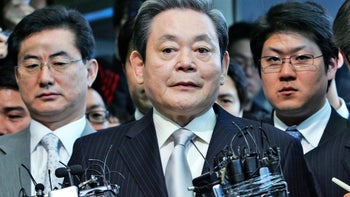Samsung's chairman Lee Kun-hee has passed away, leaving a company at its peak

Lee Kun-hee, the chairman of Samsung, and the billionaire mainly responsible for the company's transformation from an exporter of fish and noodles to the world's premier semiconductor and electronics conglomerate, has passed away, aged 78. All the while the company reported a 60% boost in earnings for the past quarter.
Without him, Samsung's tightly-knit and family-run structure may never be the same and we may see the repercussions as soon as the next product cycle after the spring releases. In fact, the new management of Samsung Mobile already shook things up by holding not one or two, but three Unpacked events in recent memory, including one for the midrange Galaxy S20 FE.
How do you evolve from selling noodles and dried seafood in 1938, when his father Lee Byung-hul started Samsung, into a company battling a Silicon Valley juggernaut like Apple for world dominance in the most coveted subset of the consumer electronics market?
Well, the answer at the time seemed to be called "chaebol." In Korean, "chae" means wealth, and "bol" is a clan, and that's all you need to know about how companies like Samsung, LG, Hyundai and others are often run - as loosely knit family business conglomerates. The family owns stakes in each of the tens of holding companies, which in turn have ownership in the other firms in the network. This prevents outside investors breaking up the conglomerate, but also enshrines performance opacity, as well as rigid "no questions asked" top-down management policy.
Lee the founder branched out into many areas such as insurance, construction, shipbuilding and yes, electronics, whereas Lee the son, who was pinpointed as the business heir in 1987, built on the founder's success by nurturing and encouraging innovation and independent thinking. He was mentoring his kids to take over before he was hospitalized in 2014, leaving the company adrift, as nobody from the family could have taken the initiative until he was recovering. Again, family things.
In the early 90s, the current Chairman Lee Kun-hee realized that the company, as huge as it was, risked becoming a low-cost volume peddler, and said the famous quote: "Change everything but your wife and kids!" The slideshow below that has a timeline of Samsung's milestones, illustrates well the culture of innovation that was happening even before that battle cry. Here are a few other quotes to remember Lee Kun-hee by and cheer the culture he may have instilled in his heirs:
- "One genius can feed millions of others. For the upcoming era where creativity will be the most important driver of business success, we need to hire the best. The economic value of one genius is more than $1 billion."
- "The business world has changed significantly. It is becoming increasingly difficult to foresee what sectors will prosper or opportunities will arise in the future. But if you hire the best and brightest, you will solve whatever issues arise in the future."
- "It is difficult to understand the true dimensions of a problem or a situation when so many things seem to be happening on the surface. This is why I urge my employees to analyze a given situation from various perspectives. This way of thinking allows one to see the true aspects of a situation, which, in turn, allows one to respond wisely."
- "Firing a CEO because his financial performance was poor is simply a bad decision. I've encountered several situations where a CEO once performed poorly in one sector then went on to perform much better elsewhere. This is one of the reasons Japanese corporations were able to compete successfully against US corporations."
In a nutshell, the Chairman's strategy seemed to be don't chase quarterly profits, but rather build the right culture to secure strategic advantages for Samsung going forward.
Nowhere is that strategy more visible than with the Galaxy Z Fold 2, an excellent heir to a problematic first edition that leaves the competition catching up. What do you think?










Things that are NOT allowed: